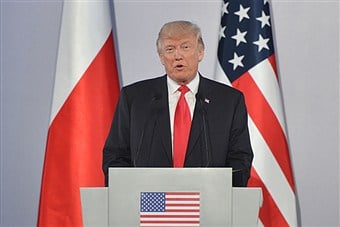President Donald Trump won the conservative and mass-attending Catholic vote in the 2016 general election. For this demographic within the Church, Trump was not the ideal candidate, but he did prove to be more palatable than his opponent Hillary Clinton.
To better understand right-wing Catholics’ decision to ultimately back Trump, it is helpful to look at his recent speech in Poland. While there are noteworthy differences in both tone and substance between his rhetoric in Poland and his rhetoric on the campaign trail, many of the elements that appeal to Catholic conservatives remain.
His discourse in Warsaw animated a crowd of Catholic Poles, and it equally rang true to conservative Catholics across the Atlantic. As an example, Kathy Schiffer’s article at the National Catholic Register bears the title “President Trump Makes a Powerful (And Very Catholic) Speech in Poland,” and she claims that there is much within it to “warm the Catholic heart.” Some of the speech is openly pro-Catholic, especially pro-conservative Catholic. Other sections are less overtly pro-Catholic but rather contain tips of the hat to a worldview accepted by many conservative church people. These subtler, yet broader remarks are the subject of this piece, and they constitute significant components of conservative Catholic thought in Poland and the United States.
There are five reasons for this connection, and each emerges at least once, if not multiple times, in the Polish speech. Primarily, Trump’s discourse points to the core of conservatism, a core that the Catholic Church shares: the necessity of conserving the wisdom of the past. Second, the speech revels in the role of the Church in Poland’s and the broader West’s defeat of totalitarian communism in Europe. Next, Trump shifts his gaze towards “radical Islamic terrorism,” an enemy of both the United States and Catholicism. At the level of theory, the speech hints at St. John Paul II’s teaching of philosophical “personalism,” which contains conclusions that many conservative Catholics and Republicans hold in common. Finally, the President’s pro-life rhetoric energizes Catholics who have been waiting eight years to make national progress on rights for the unborn.
The Church today stands on the shoulders of historical people and events. Christ communicated the good news to his disciples, and they in turn handed on the message to their descendants to the present day. All Catholic doctrine comes from this deposit of faith or depositum fidei.1 St. Paul instructs, “Stand firm and hold fast to the traditions that you were taught by us, either by word of mouth or by our letter” (2 Thessalonians 2:15). The American conservative parallel to this reality would be a dedication to an “originalist” interpretation of the Constitution, that is, an interpretation that allows for no more than the document’s writers originally intended. The Constitution, as the depositum fidei, is complete and sealed off to change.2 President Trump’s nomination of justice Neil Gorsuch to the Supreme Court aligns with this way of proceeding.3 In Poland, conservatism’s desire to conserve the ideals of the past shows up in “clear and distinct” ways. Trump states, “We celebrate our ancient heroes, embrace our timeless traditions and customs.”4 To look into the specifics of this past/present embrace, it will help to consider the speech’s frequent and powerful references to Poland’s triumph over totalitarian communism.
The Cold War is fresh in the collective memory of many of Trump’s older conservative Catholic voters, and it is even more present in the minds of the Polish people, whether they have dwelt in the U.S. for generations or whether they live today in the Polish cities that still bear ugly scars from the conflict. The Cold War is also alive in the hearts of millions of Catholics who joyfully welcomed Pope Francis’ canonization of Pope John Paul II in the spring of 2014. Many of these Catholics recall the critical role that the Polish Pope played in the downfall of communism. With this history in mind, President Trump boldly retold the story of John Paul II’s first visit to Poland as Pope:
And when the day came on June 2nd, 1979, and one million Poles gathered around Victory Square for their very first mass with their Polish Pope, that day, every communist in Warsaw must have known that their oppressive system would soon come crashing down. (Applause.) They must have known it at the exact moment during Pope John Paul II’s sermon when a million Polish men, women, and children suddenly raised their voices in a single prayer. A million Polish people did not ask for wealth. They did not ask for privilege. Instead, one million Poles sang three simple words: “We Want God.”
This selection is incredibly appealing to conservative American Catholics who saw the Republican President Ronald Reagan fight strongly against worldwide communism, especially in Poland. It is no surprise that Trump makes reference to a statue of Reagan in Warsaw earlier in the speech. Moreover, like Reagan, Trump earns points with Catholics on the right for his unapologetic inclusion of God in a political speech.
Trump acknowledges that communism is no longer a serious threat to Poland, but he continues by asserting that there is now a new enemy: “radical Islamic terrorism.” It is well known that the Polish Law and Justice Party has closed off the nation’s borders to Middle Eastern immigrants. Trump’s travel ban shares this goal. The rationale used by Trump and Law and Justice is twofold: (1) Middle Eastern immigrants do not assimilate, and (2) some of them may be terrorists. The former is part of a larger populist and conservative Euro-American movement to protect Western culture from the influence of Islam. A short anecdote from a German friend might help explain this idea. He once explained, “A group of Muslims come to a small town in Germany and build a mosque bigger than our cathedral. A group of Catholics go to the Middle East and get shot for making the sign of the cross. It isn’t fair. It isn’t equal.” The latter is a response to ISIS’ claim that it hides terrorists among refugee families seeking to enter the U.S. and Europe. This thought pattern does appeal to the populist, conservative wing of the U.S. Catholic Church, which emphasizes the rights to national sovereignty and national security over the rights of migrants and refugees.
There is one final component of the Polish speech that is representative of Trump’s ability to mobilize the right in the Church, and it has to do with the philosophy of “personalism.” This system of thought, especially promoted by the Polish Pope, discards any philosophy that treats human persons primarily as objects, whether objects of economic systems, political systems, or scientific thought. Rather, the human person’s inalienable dignity and agency must be the center and foundation of any worldview. In the case of theistic personalists, God is the guarantor and ground of this dignity and agency. Following this line of thought, one can see that personalism resonates much more with the right than with the left.5 Whereas the left often looks at people from the perspective of the broader structures in which they move, the right has tended to focus on centrality of the individual person. An example would be the right’s language about “hard work” and “personal resolve.” Trump’s speech follows this personalist line: “Our own fight for the West does not begin on the battlefield — it begins with our minds, our wills, and our souls.” In Trump’s speech, the transformation of structures and systems is always secondary to the transformation of the human heart, beginning in the household.6
Strategically, Trump helped himself the most among conservative Catholics by selecting the unabashedly pro-life Governor Mike Pence as his running-mate. The decision calmed some skeptical minds who were questioning Trump’s unstable record on abortion. The conservative Catholic pro-life outlet Life Site News received Pence with open arms last summer, saying that he “racked up a record as a pro-life conservative during his six terms in the U.S. House of Representatives.” Many conservative pro-life Catholics, vocal and well-organized, see abortion as the single issue that determines their votes. When it came to Trump versus Clinton, Trump, now side-by-side with Pence, appeared to be the better option. It was inevitable that Trump would make at least one reference to the topic in Poland. He declares, “And above all, we value the dignity of every human life, protect the rights of every person, and share the hope of every soul to live in freedom.” The point is oblique, but the same Life Site News read it as strong enough to be a “pro-life declaration” and titled an article, “Trump gives incredible pro-life, pro-God speech in Poland.” Though a weak pro-life candidate in many respects, Trump passed the test for many pro-lifers in 2016 and continues to do so from the Oval Office.
Together, these five rhetorical patterns are like five fingers pressing down to tip the conservative Catholic scale slightly in Trump’s favor. Some have abandoned Trump between his inauguration and the present, but many continue to see these points as reasons to maintain their support. For those in the Church for whom any support of Trump is unimaginable, the rhetorical strategies above are unconvincing, inauthentic, and/or downright scary. These Trump opponents have a duty of conscience to oppose him on areas of difference–be it through publish protest, legislative action, or judicial action. However, there is also a challenge for anti-Trump Catholics to refrain from removing themselves from political dialogue out of anger or fear, even if such anger or fear is justified. The Second Vatican Council calls Catholics and all people of good will to “foster [sound] cooperation” with the “political community,”7 and, at present, the governing political community is composed of a majority of Republicans in both legislative chambers and in the White House. The degree to which democracy in the United States survives largely depends on the extent to which Trump supporters and Trump dissidents are willing to talk to each other–and that means engaging with the rhetoric above. There is no peace without justice, yet there is no justice without cooperation.
- See paragraph 10 of Dei Verbum. ↩
- Of course, in the case of the Constitution, there is the possibility of amendments, but there is no such exception in the case of the depositum fidei. ↩
- Gorsuch’s originalism is debateable, but several sources agree. See NPR and CNN as examples. ↩
- All references to Trump’s speech come from https://www.whitehouse.gov/the-press-office/2017/07/06/remarks-president-trump-people-poland-july-6-2017 ↩
- To be clear, personalism is not the most widely accepted philosophy among the U.S. Catholic right; however, there are premises and implications that the two share, namely, the idea that the individual human person is the basic arena upon which any broader social transformation is played out. ↩
- CDF’s Instruction regarding Liberation Theology ‘84, para. 15: Nor can one localize evil principally or uniquely in bad social, political, or economic “structures” as though all other evils came from them so that the creation of the “new man” would depend on the establishment of different economic and socio- political structures. To be sure, there are structures which are evil and which cause evil and which we must have the courage to change. Structures, whether they are good or bad, are the result of man’s actions and so are consequences more than causes. The root of evil, then, lies in free and responsible persons who have to be converted by the grace of Jesus Christ in order to live and act as new creatures in the love of neighbor and in the effective search for justice, self-control, and the exercise of virtue. http://www.vatican.va/roman_curia/congregations/cfaith/documents/rc_con_cfaith_doc_19840806_theology-liberation_en.html ↩
- Gaudium et spes, para. 76 ↩


